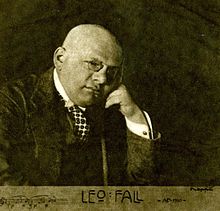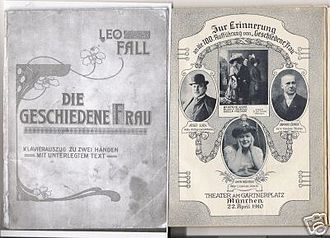- Die geschiedene Frau
-
Leo Fall  Operettas
Operettas- Die Dollarprinzessin (1907)
- Die geschiedene Frau (1908)
- Madame Pompadour (1923)
Die geschiedene Frau (The Divorcee), is an operetta in three acts by Leo Fall (1873-1925) with a libretto by Victor Léon, after Victorien Sardou's Divorçons!. Conducted by the composer, It opened to considerable success at the Carltheater in Vienna on December 23, 1908 with Hubert Marischka as Karel.[1]
It was translated into Italian and premiered at the Teatro Lirico Internationale in Milan as La divorziata on 16 August 1909, then translated into English and performed at the Vaudeville Theatre in London as The Girl in the Train from 4 June 1910. Performances followed in Rome on 19 January 1911, in Paris as La divorcée at the Théâtre Apollo on 18 February, and in Madrid as La mujer divorciada at the Teatro Eslava on 23 December the same year, conducted by the composer. [2]
Contents
Roles
Role Voice type Premiere Cast, 23 December 1908
(Conductor: Leo Fall)Jana soprano Mizzi Zwerenz Gonda van der Loo soprano Annie Dirkens Martje soprano Mizzi Jesel Lucas van Deesteldonck tenor Richard Waldemar Karel van Lysseveghe tenor Hubert Marischka Scroop tenor Josef König Willem baritone Max Rohr Pieter te Bakkenskijl baritone Carl Blasel English adaptations
The 1910 English adaptation, The Girl in the Train, was produced in two acts by George Edwardes at the Vaudeville Theatre in London, with lyrics by Adrian Ross, and ran for 340 performances. The London production starred Robert Evett, Phyllis Dare, Huntley Wright, Arthur Williams and Rutland Barrington.[3] The American production opened at the Globe Theatre in New York (where the Lunt-Fontanne Theatre stands now) on October 3, 1910 with a new adaptation by Harry B. Smith, which subsequently toured in Britain, America and Australia, among others.[4]
In the English version, Gonda van der Loo, a young actress travelling on a train in Holland at night, is unable to secure a berth. Karel van Raalte, a young gentleman, generously offers his compartment to her. The two, however, become locked in the compartment. Their cries and knocks are unheard, and they are forced to spend the night together. Van Raalte's wife learns of the incident and jealously brings divorce proceedings. After many complications and much time spent in divorce court, however, Van Raalte and his wife are reunited, and the Judge finds romance with the actress.[5]
Musical numbers (Adrian Ross version)
- Act I - Court of Justice, Amsterdam.
- No. 1 - Prelude - Jana - "Only one word I add, that I have loved him well..."
- No. 2 - Ensemble - Karel, President and Chorus - "Confound it all, confound it all..."
- No. 2a - Reprise - Chorus - "Confound it all, confound it all..."
- No. 2b - Reprise - Chorus - "Oh Jiminy, Oh Jiminy, Oh Jim, Oh Jiminy! ..."
- No. 3 - Quintette - Jana, Martje, Karel, Willem and President - "You see we got married the very same day..."
- No. 3a - Melodrame - Entrance of Gonda
- No. 4 - Song - Gonda - "We poor little girls with a part to play must often be travelling night and day..."
- No. 4a - Exit Chorus - "Oh Jiminy, Oh Jiminy, Oh Jim, Oh Jiminy! ..."
- Nos. 5 & 6 - Scena and Finale - Karel, Jana, Gonda, President, etc. - "Now, Jana, say, why should you be so jealous? ..."
- Act II - Drawing Room, Karel Van Raalte's House.
- No. 7 - Introductory Dance
- No. 8 - Duet - Gonda and Karel - "I'm no lover, as you'll discover by hearing me propose..."
- No. 9 - Song - Karel - "Pictured face, that smile in your place, with joy of a day that's gone..."
- No. 10 - Song - Jana - "I wonder whether you can tell me a secret that I long to know! ..."
- No. 11 - Trio - Karel, Jana and Van Tromp - "Children, I feel there's a sort of a change! Say, is there anything wrong? ..."
- No. 11a - Additional Duet - President and Van Tromp - "Oh, Memory! Oh! the merry days when we were boys..."
- No. 12 - Quintette - Gonda, De Leije, Van Dender, President and Van Tromp - "So to put an end to doubt..."
- No. 13 - Duet - Gonda and President - "So you catch her! ... Catch her? ... Catch her! ... If you can..."
- No. 14 - Waltz Duet - Jama & Karel - "You give your word?... I give my word! I'll keep your promise, tho' it seems absurd..."
- No. 15 - Finale - Jana, Gonda, Van Tromp & President - "Gonda, charming little Gonda! You're as good as you are clever..."
Film version
A film version was made in 1953 under the original title Die geschiedene Frau, but released in Britain, France and the United States as The Divorcée. it was directed by Georg Jacoby, and starred Marika Rökk and Johannes Heesters. [6][7]
References
- ^ Traubner, Richard. Operetta: A Theatrical History (2003) Routledge, p. 287 ISBN 0415966418
- ^ Amadeus Almanac, accessed 22 February 2011
- ^ Information about the London production at The Play Pictorial site
- ^ NY Times article on the 1910 New York production
- ^ NY Times article about operettas including The Girl in the Train
- ^ Information about the German 1953 film
- ^ IMDB page on the film
External links
Categories:- German-language operettas
- Operas by Leo Fall
Wikimedia Foundation. 2010.

